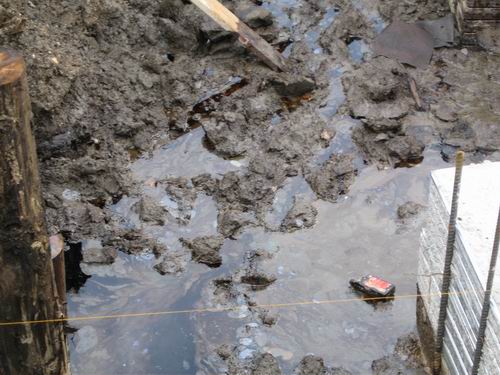
We didn’t know there was a Wikipedia entry on the Roebling Oil Field until we got an email telling us that it had been deleted. So, we only know that an entry called “Williamsburg Oil Spill” is gone. What we find amusing, though, is some of the logic for killing it that was voiced by those that prevailed in voting to remove the item. Included in the “troubling” statements in the article cited by those in favor of yanking it was the following:
The sentence “The Williamsburg “aka Roebling” Oil Spill is getting a lot of attention from the New York State Department of Environmental Conservation, but not much attention from the mainstream media.” is also troubling, since the only secondary sources are essentially a blog (Gowanus Lounge) and a short New York Times article.
Glad to know we were thrown in with the Times story, though, in terms of our level of disrepute. Which, apparently, is quite severe for the WikiPeople:
While it may be amateur journalism, and regardless of the credentials of the author, the Gowanus Lounge blog is an independent blog hosted on Blogspot, and I don’t think it is a reliable source.
We’d argue that the Roebling Oil story is deserving of a Wikipedia entry just as many other “local” topics are. We’d also argue that serious journalistic blogs such as Curbed and Brownstoner and, dare we say, GL–regardless of where the online reports are hosted–are reliable sources of information. To tar and feather online media as being “unreliable” simply by virtue of the fact that they exist online rather than coming off a printing press–or to insist upon viewing them as “cute” and “quirky”–is an antiquated concept the flow of information.
Regardless, however, the story is very important because it touches on a host of environmental issues in Williamsburg and North Brooklyn that have been largely overlooked for decades by the mainstream media and have gotten little serious attention from even community-based media. They are particularly compelling as Williamsburg’s formerly industrial sites are developed for residential use with a fairly hands-off regulatory approach and without any attention from either the publications that have investigative reporters on staff to check out, say, the toxicity of Williamsburg waterfront parcels and whether regulators are doing their jobs and clean ups are adequate to safeguard future residents or even the community-based or local publications that can also be said to have been asleep at the switch on some issues, at least, in terms of sounding alarm bells.
We digress, however. We’d argue that the Roebling Oil Field and the issues that it raises deserved a Wikipedia entry. You can check out the entire discussion here if you wish. That, of course, is one of our unreliable photos of the imaginary local problem–whose local source has yet to be identified or, at least, communicated by the Department of Environmental Conservation to the public–above.

3 responses so far ↓
1 jukeboxgraduate // Jul 25, 2007 at 9:43 am
hey Bob,
Wikipedia’s gone off the deep end lately with the whole “reliable source” thing, to the point where they’ve pretty much jumped the shark. I know you like to fight battles but fighting the Wikipedia geeks is so not worth your time or energy.
2 Anonymous // Jul 25, 2007 at 11:13 am
There was also this article:
http://nymag.com/news/features/32865/
3 Preworn // Jul 25, 2007 at 5:06 pm
Wiki nerds are the worst. The basic reality is you’re getting tons of 17-23 year old people with too much time on their hands reviewing the “sourcability” of articles they know nothing of.
And the problem is that if you are knowledgable about the subject BUT they disagree with you, they will “Wiki swarm” you and make sure ANY edit you make is scrutinized to death.
For example, I had a run-in with a former Wiki admin named Chris Griswold who went out of control in deleting comedy/improv articles for the most tenuous of reasons. It turns out that when all was said and done he was—and is—a frustrated improv actor who has axes to grind with ANY improv group he does not like. To the extent that he even set up “shill/puppet” accounts where he and his shills would debate and edit articles to form a fake consensus. Someone thankfully busted him and got his admin status revoked.
Ultimately Wikipedia can be good if they could just devise a way where pale comic book nerds don’t end up having a stronger voice just because they spend more time online than others.